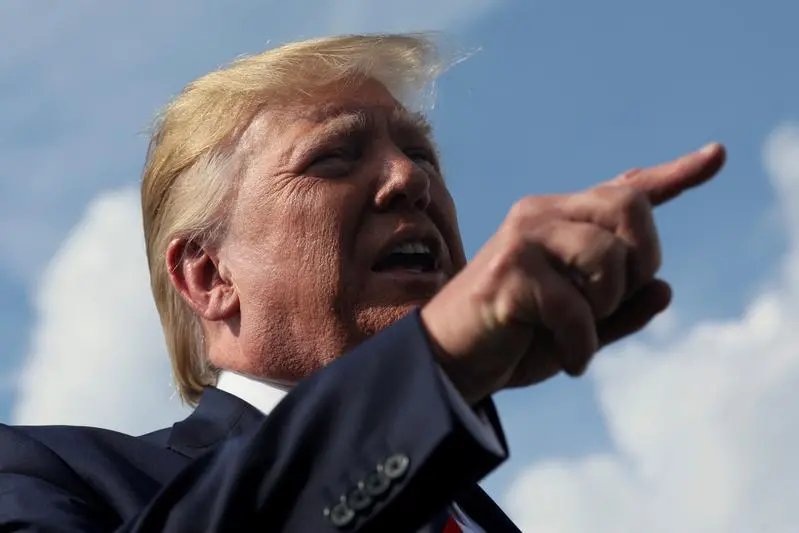PHOTO
NEW YORK: Stocks, the dollar and oil prices fell on Friday while safe havens rose after U.S. President Donald Trump threatened to further escalate his trade war with China "this afternoon," following a new round of retaliatory tariffs from Beijing.
Earlier on Friday China's Commerce Ministry said in a statement it would impose tariffs on about $75 billion in imports from the United States including some agricultural products, crude oil and small aircraft.
Trump responded mid-morning in a series of tweets, writing that "American companies are hereby ordered to immediately start looking for an alternative to China."
Trump cannot force U.S. companies to abandon China and he gave no detail on how he might proceed with any such order. But his series of tweets was seen as a harbinger for yet another escalation of the trade war.
Trump had not announced more actions against China when markets closed in New York.
The tweets "certainly heightened concerns about trade and its drag on global growth," said Craig Bishop, lead strategist of the fixed income group at RBC Wealth Management at Minneapolis.
"It has heightened chances of a recession. The President is his own worst enemy when he tries to manage both fiscal and monetary policies."
Stocks that benefit during economic expansions fell the most on Wall Street, also hinting at recession concerns.
"There is a lot of worry here. I would say what (Trump) is tweeting is disconcerting. It's a fair reaction from the markets. I don't think anyone thought we'd get to this level," said Michael O'Rourke, chief market strategist at JonesTrading.
The Dow Jones Industrial Average fell 623.34 points, or 2.37%, to 25,628.9, the S&P 500 lost 75.84 points, or 2.59%, to 2,847.11 and the Nasdaq Composite dropped 239.62 points, or 3%, to 7,751.77.
The pan-European STOXX 600 index turned sharply lower after Trump's tweets, dropping 1% in the last half hour of trading to close down 0.78%, while MSCI's gauge of stocks across the globe dropped 1.57%.
Emerging market stocks lost 0.20%, an index of Latin American shares dropped more than 3% to close at its 2019 low and U.S. dollar-denominated Nikkei futures fell 2.0%.
OIL, YIELDS FALL
Oil prices fell after China's retaliatory tariffs announcement highlighted concern that the trade dispute between the world's two largest economies could slow global growth or even trigger a recession.
Trump's tweets made matters worse.
"We still view the U.S.-Chinese trade standoff as a major bearish consideration that will likely be requiring additional downward oil demand adjustments as this year proceeds," said Jim Ritterbusch, president of Ritterbusch and Associates.
U.S. crude fell 2.67% to $53.87 per barrel and Brent was last at $59.11, down 1.35% on the day.
Trump’s comments came after Federal Reserve Chair Jerome Powell said the U.S. central bank will "act as appropriate" to keep the economic expansion on track, but noted rising risks.
Powell's remarks had given markets some relief after the overnight announcement from Beijing. Trump's tweeted response to the speech asked who is "our bigger enemy" between Powell and China's President Xi Jinping.
The two-year/10-year yield curve inverted last week for the first time since 2007, a signal that a U.S. recession is likely in one to two years. The curve has traded in and out of inversion over the past three days.
U.S. Treasury yields fell, with 10-year notes last up 22/32 in price to yield 1.5351%, from 1.61% late on Thursday.
The U.S. dollar fell after Powell's comments and dropped further after Trump's tweets.
The dollar index fell 0.47%, with the euro up 0.53% to $1.1137.
The Japanese yen strengthened 0.95% versus the greenback at 105.45 per dollar, while sterling was last trading at $1.228, up 0.24% on the day.
Spot gold added 1.8% to $1,525.37 an ounce.
(Reporting by Rodrigo Campos; additional reporting by Karen Brettell, Saqib Iqbal Ahmed, Stephanie Kelly and Gertrude Chavez-Dreyfuss; editing by Chris Reese, Tom Brown and Sonya Hepinstall)
© Reuters News 2019





















